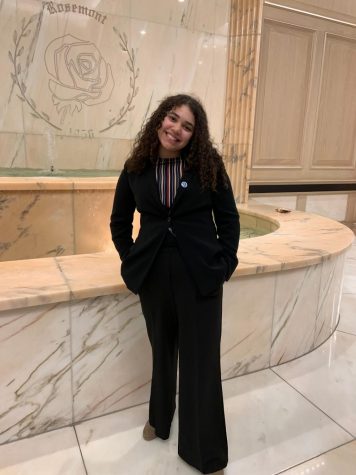White writers, Black issues
February 22, 2021
 The Evanstonian is, and always has been, made up of a predominantly white staff. The majority of the Black stories that are told are missing the first-hand experiences and genuine connection to the coverage. Statistics and interviews may make up for some the lack of knowledge, but white writers do not, and will never be able to, understand the pain behind some topics they are choosing to write about.
The Evanstonian is, and always has been, made up of a predominantly white staff. The majority of the Black stories that are told are missing the first-hand experiences and genuine connection to the coverage. Statistics and interviews may make up for some the lack of knowledge, but white writers do not, and will never be able to, understand the pain behind some topics they are choosing to write about.
As a Black reader and opinion writer for the Evanstonian, seeing white people write about the struggles that come with being Black seems as though the writers feel like they understand the experience. These white writers are not able to convey the opinion of a Black person which causes possible miscommunication as well.
“I just think there’s just a lot of stereotypes built in [to white spaces], and it’s really hard to break stereotypes, especially when they’re in media everywhere you go,” senior Olamide Thomas explains.
As the Evanstonian has evolved, especially in the last decade, Black experiences are often being written about as they are commonly talked about in the news, media and general conversations around town. The representation in our publication cannot speak to the immediate struggles the Black community in Evanston faces, and it is hard to correctly convey the opinions of students without having them to write on staff. Topics addressed by the publication are touchy for people of color and a hard conversation to tackle. When white people address race in articles and speak on it, their own identity desensitizes the conversation and even can spread false information further.
The Black experience in America is not universal for all, let alone universal for Black people. In my experience, white writers assume an opinion of a Black person before even sitting down for an interview; it comes off as an experience of their own. Black people often have to correct white people on their activism, and with the audience of the Evanstonian, it may be hard to share those disagreements because of the potential backlash that could be given.
It’s important for white writers to reflect on the experiences they are sharing, about because they have no experience with it. Some things to think about for white writers are considering who is your audience is, being international with who you are interviewing and making sure you are intentional that the experience is not something you could or will ever understand.
It is important to reflect on the issues we are sharing as a publication. For the past 100 years of the publication’s existence, white writers and audiences have curated the publication. It is important for the publication to focus on, and make sure we investigate, how our pieces center Black voices. We must make sure that the publication works towards making sure the opinions are accessible and are presented to Black students and writers, as it is not fair to be sharing a non-universal opinion to the Black students.





















